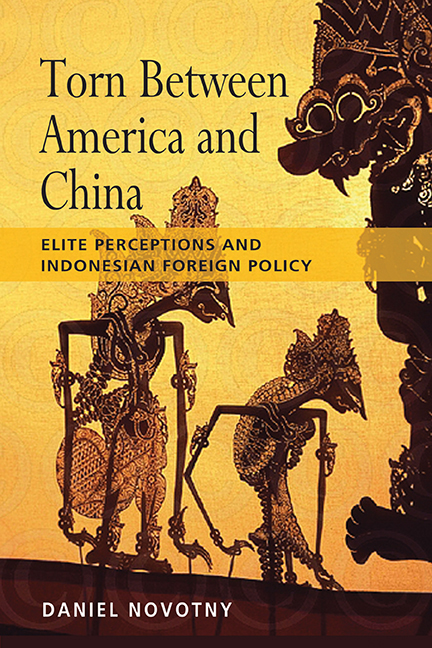Book contents
- Frontmatter
- Dedication
- Contents
- Foreword
- Preface
- List of Figures
- Acknowledgements
- PART I THE CONTEXT
- PART II THE PERCEPTIONS “ANTARA DUA KARANG”
- PART III ELITE CONSENSUS AND POLICY OUTCOMES
- 6 The Bigger Picture: Elite Perceptions of Other Powers
- 7 The Indonesian Elite Facing a Changing World
- 8 Conclusion
- Glossary
- Abbreviations
- Bibliography
- Index
- Note on the Author
8 - Conclusion
from PART III - ELITE CONSENSUS AND POLICY OUTCOMES
Published online by Cambridge University Press: 21 October 2015
- Frontmatter
- Dedication
- Contents
- Foreword
- Preface
- List of Figures
- Acknowledgements
- PART I THE CONTEXT
- PART II THE PERCEPTIONS “ANTARA DUA KARANG”
- PART III ELITE CONSENSUS AND POLICY OUTCOMES
- 6 The Bigger Picture: Elite Perceptions of Other Powers
- 7 The Indonesian Elite Facing a Changing World
- 8 Conclusion
- Glossary
- Abbreviations
- Bibliography
- Index
- Note on the Author
Summary
THE SUMMARY OF FINDINGS
The Indonesian foreign policy elite's strategic thinking about the country's foreign relations and how to achieve maximum security for Indonesia in the post-Cold War period have been to a great extent in line with the precepts of the balance-of-threat theory. However, we have found that the balance-of- threat theory is capable of explaining Indonesia's foreign policy dynamics provided it extends the analysis beyond the elite's threat perceptions by putting more emphasis on the degree of the elite's consensus about the threat.
Although the interviewed members of the Indonesian elite ostensibly declared that they generally regard threats to the country's national interest that are internal in origin as more dangerous and serious than external threats, it should not be by any means interpreted as that the leaders are not concerned about the more traditional state-based security threats. In fact, the elite perceives both the United States and China as the two most potent state-based external factors with the potential to endanger Indonesia's national interests and security. From the perspective of many Indonesians, both at the elite level and public at large, Indonesia's relationship with the “incumbent” and the “rising” superpower can be viewed in a triangular form. On the one hand, among all state actors, the interviewed leaders identified the United States during the George W. Bush's Administration as the most significant malign factor affecting Indonesia's national security. China's growing influence is at present seen quite positively for it enhances multipolarity in the international system and eases the pressure especially from what is widely considered as an excessive, ubiquitous power of the United States. Concurrently, however, China is seen as the principal danger in the long run and a number one external factor that needs to be constrained.
The Indonesian leaders are convinced that, in light of the uncertainty about how China will use its power in the future, it is absolutely vital for Indonesia to hedge its relations with China. The elite's main security concern is about the trajectory the rising might of China will follow in the future, namely the prospect of facing a giant with hegemonic intentions at its doorstep.
- Type
- Chapter
- Information
- Torn between America and ChinaElite Perceptions and Indonesian Foreign Policy, pp. 346 - 352Publisher: ISEAS–Yusof Ishak InstitutePrint publication year: 2010

